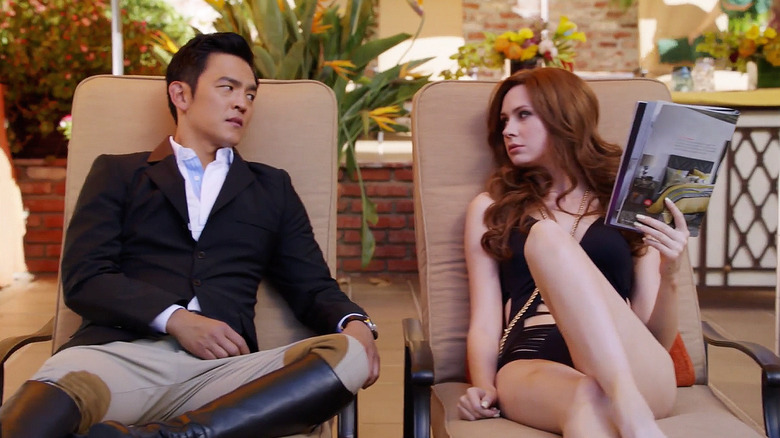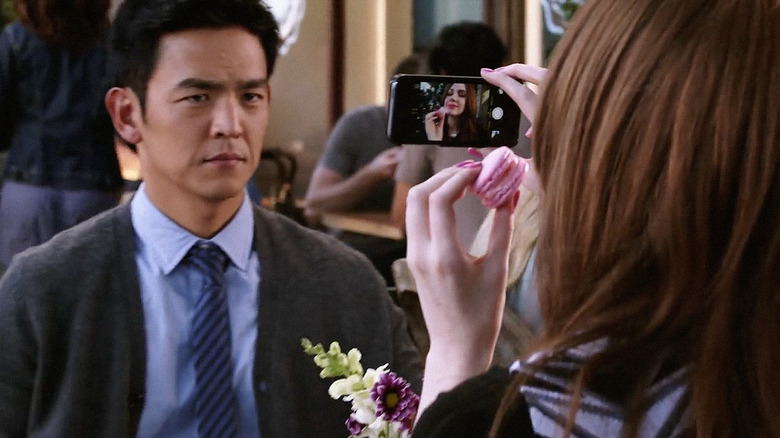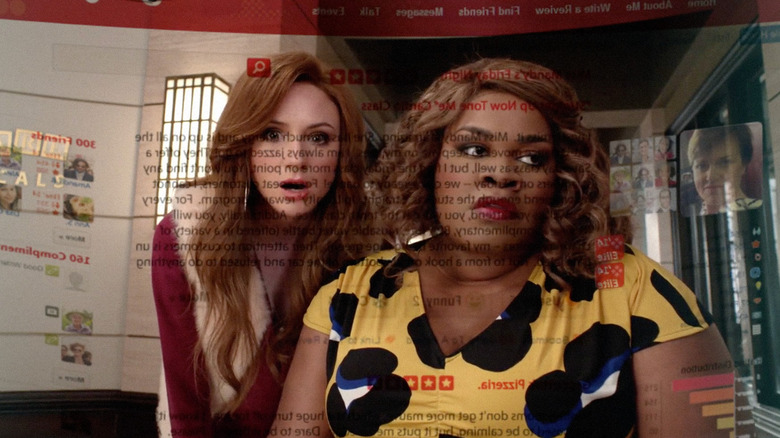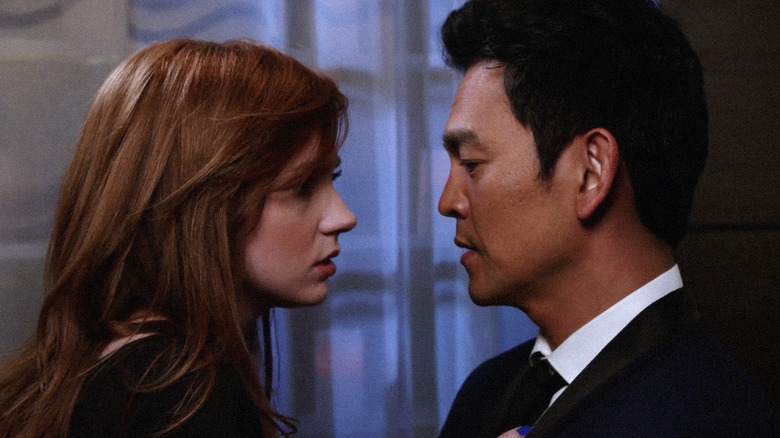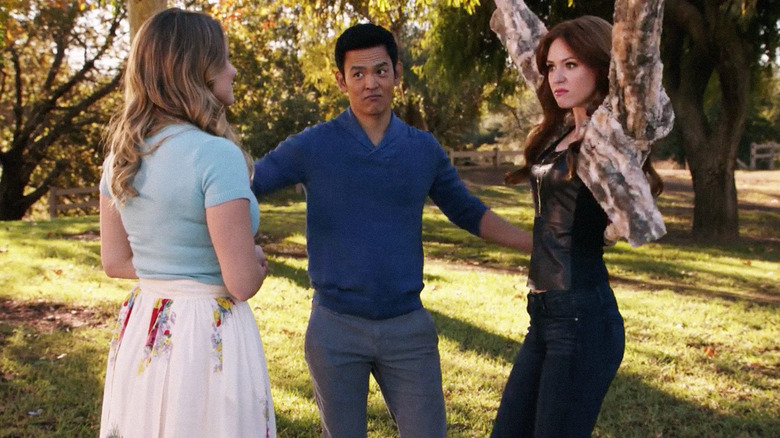TV, Interrupted: How Selfie Actually Slayed
(Welcome to TV, Interrupted, a series where the /Film team remembers, eulogizes, and makes a case for the revival of TV shows we loved that were canceled far too soon.)
Few relationships carry such an inherent risk as the ones we share with our favorite TV shows. Nowadays, it's risky to get attached to any show outside of the Dick Wolf Lexicon or the celebrity competition genre. Even as networks transition to streaming, many series are likelier to face cancelation than renewal. Of course, if the fandom is loud enough, there's always the chance of redemption. Certain fan-favorites (like the recent "Sanditon" or "One Day at a Time") have been rescued solely by the efforts of their supporters.
Unfortunately, the exceptions don't always prove the rule: as we've seen with countless beloved series, a dogged #SaveXYZ campaign often lands on dispassionate ears. And before Netflix made cancel culture something of a standard operating procedure, ABC was (and actually, still is) famous for bringing the ax down hard on its most promising shows.
One of the network's cruelest casualties was the short-lived "Selfie," a modern-day adaptation of "My Fair Lady" which was, in turn, adapted from "Pygmalion." Eliza Doolittle became Eliza Dooley, a socially-naive social media influencer who thrived before influencers were really a thing and Instagram posts were only as good as their original filters (which, to be clear, was not that good at all). She's a not-so-subtle stand-in for millennials, the generation that became the butt of one big societal joke in the 2010's. And though she enjoys the attention of hundreds of thousands of "friends" online, she doesn't have quite so many IRL.
Enter Henry Higgs, a marketing exec at the pharmaceutical company where Eliza also works. As this is a sitcom, and a romantic one at that, Henry is Eliza's polar opposite: chronically offline and insufferably proud of it. According to Eliza, Henry is "so out of touch, he's..." pause for effect "...not even on Facebook" (incidentally, the only place that "Selfie" is currently streaming). How will he know who from high school has gotten ugly?!
The joys (and immediate consequences) of Internet stalking will have to wait. Because when Eliza discovers that Henry helped rebrand a product that gave its users satanic hallucinations (!!!), she promptly asks him to do the same for her own image. Over the course of thirteen episodes, Henry endeavors to do so — but not without catching a few feelings first.
Why Selfie Was Great
Like with any good comedy, cast and characters are crucial. And though "Selfie" wasn't perfect, the show was impeccably cast. Apart from hosting a sizzling romance between Eliza and Henry — played to perfection by Karen Gillan and Internet Husband John Cho — "Selfie" was also a pretty quirky workplace comedy with a fully-fleshed ensemble.
Da'Vine Joy Randolph ("High Fidelity," "The United States vs. Billie Holiday") is Charmonique, a refreshing spin on the sassy black assistant that's been done to death elsewhere. She's a single mother with an adorable son who sounds like Eddie Murphy when he cries. She loves herself, as well as the room in her house that boasts a "coliseum" of climate-controlled wigs. She also went to Yale, but never talks about it — apart from namedropping it once and swiftly changing the subject the moment her coworkers ask "Wait, you went to Yale?!"
"Supergirl" patriarch David Harewood makes a hilarious turn as Sam Saperstein, Henry's (and everyone else's) boss. His bromantic attraction to Henry makes him something of a paladin for anyone in love with John Cho in real life. Character actor Brian Huskey also appears in a substantial role. Then there's "Grey's Anatomy" alum Giacomo Gianniotti as Eliza's drippy boyfriend, Freddy. He, like Eliza and Henry, was also pulled from "Pygmalion" — but in this adaptation for modern audiences, he takes on an endearing nuance that his predecessor was never afforded.
Everyone's role in "Selfie" feels surprising and gratifying, but none more than Gillan and Cho's. Gillan's comedic chops have been put to good use in the "Guardians of the Galaxy" films, but in "Selfie" she's given much more to play with. If the show were on the air today, she'd be a TikToker for sure, carving out a niche among the gloriously-tall white women who scam men for a living. But Eliza is not without substance: her performance is merely an effort to mask the primal wound of her adolescence. "Selfie" is at its best when it forces Eliza to confront her fears and immaturity ... as well as her romantic feelings for Henry.
Cho is a perfect match for Gillan, in a way that shouldn't work, but does — spectacularly. It's hard to forget that Cho is best known for his contribution to the Harold and Kumar Cinematic Universe, but he's genuinely so funny, even as the Straight Man. His stuffy (yet scintillating) charisma would have given Ben Wyatt a run for his money. And just like with Eliza, Henry shines the most when he lets his guard down and allows himself to make genuine connections.
Why Selfie Was Canceled
It might be hard to believe, given the vehement love for "Selfie" now, but the show was not an instant hit. "Selfie" was impaired by a number of tricky circumstances when it first premiered. For starters, there were issues with the title. The word "selfie" was a definitely a buzzword in 2014 — that year was unofficially The Year of the Selfie — but it was closely associated with millennials. The 2010's were a time of vilification for the emerging "me me me generation." In 2013 (just a year before "Selfie" aired) Time conducted a patronizing study on the link between phone use, narcissism and entitlement. Selfies were a symptom of the problem, so any show of the same name would undoubtedly come with a cringe factor.
"Selfie" also had an uphill battle with viewership. The series aired on the tricky Tuesday slot at 8 P.M., going up against established shows like "The Flash" and "NCIS." Its first episode showed promising numbers, but afterwards "Selfie" suffered a 0.9 rating that persisted until ABC pulled the show six episodes later. The news came in tandem with the release of the most coherent episode thus far, "Never Block Cookies," which finally made good on the will-they-won't-they between Eliza and Henry, and locked down the show's conflicting tone.
The network might have been ready to block "Selfie" from the airwaves, but its fandom didn't quit nearly so easily. One Erika Lawson even launched a Change.org campaign to save the show — and received a whopping 65 thousand signatures by the end of the year.
Guy Aoki, co-founder of the Media Action Network for Asian Americans (MANAA) put his own connections and love for the show to good use. Aoki reached out to no less than three TV executives — ABC President Paul Lee, Tim McNeal (the network's Head of Diversity), and Warner Bros. President Peter Roth — to secure a second life for "Selfie." Aoki went above and beyond, even documenting his efforts for Rafu Shimpo, but in the end, the networks didn't budge. As a sort of consolation prize, ABC partnered with Hulu to stream the show's remaining seven episodes.
Unfinished Business
It makes sense that "Selfie" was axed just as the show began to find its footing, but it was no less frustrating for fans who saw potential from the get-go. Sure, the pilot was bad, if you hate fun. I'd argue in favor of its campier risks even now. At least it was trying new things. Those risks paid off as the main cast built its rapport, to the point that even its most vocal haters rescinded their poor reviews by episode 6.
Even as it struggled, Cho and Gillan still carried. It's the one thing the show always got right. As Henry toils over Eliza's rebrand, "changing" her into a more empathetic and present human being, Eliza starts to change him in turn. Though he believes that the Internet has turned everyone into antisocial monsters, he falls prey to equally-antisocial — even callous — tendencies himself. Eliza encourages him to open up, just in a different way. The moment they both realize that they're better together, Eliza dumps her aforementioned boyfriend and bares her feelings to Henry (as well as the rest of her body; it's quite scandalous). All this before the season finale!
Unfortunately, Henry — himself in a pseudo-happy relationship — is reluctant to go out on the line for love. He cites every excuse in the book, indelibly hurting Eliza in the process. They fall out hard, and Eliza reverts to her Material Girl charade after performing a spine-tingling cover of Sia's "Chandelier."
A few episodes pass in which they barely speak, but they bury the hatchet just in time for the final episode. Eliza seems pretty over it — she has, after all, rebounded with Freddy and rebuilt their relationship on a surprisingly mature foundation. It's Henry who finds himself tormented by what could have been. The season finale ends on a hopeful note: Henry promises that, though he wasn't ready for Eliza before, he will be next time. And that would be fantastic, if there ever was a next time.
Will Selfie Ever Return?
The path laid out at the end of "Selfie," while a bit cliched, seems like a natural progression for Henry and Eliza. It's frustrating that we never got to see how they'd finally end up together, but at the same time, showrunner Emily Kapnek still managed to wrap the doomed series with a satisfying conclusion. The first (and only) season of "Selfie" feels like a contained story, one with rewarding arcs for its main cast that could have continued thereafter, but didn't necessarily have to.
That being said, is there a chance that "Selfie" could continue? The short answer is no, but I like to be optimistic — and apparently so do the show's former stars. Both Gillan and Cho have discussed returning to "Selfie" on multiple occasions, and both seem pretty open to it. Gillan recently mused that, if she ever were to reprise her take on Eliza, she'd prefer exploring "Selfie" in a short-form medium. "I don't know if I like a full-time full series," the actress told Refinery29. Given her growing role as Nebula in upcoming films like "Thor: Love and Thunder" and the third "Guardians of the Galaxy" installment, that makes a lot of sense.
Cho has since called his time on "Selfie" a "very fulfilling" experience. "I was bummed about it going away," he said in an interview with NPR. "There aren't a whole lot of romantic comedies on the air right now." – even fewer with an Asian lead, a fact that gave "Selfie" considerable appeal. This stings a bit more knowing that Cho's latest starring vehicle, Netflix's "Cowboy Bepop" adaptation, was also recently canceled. Even in a post-#StarringJohnCho society, fans of the actor (and of inclusive casting in general) are still fighting for representation.
It's been nearly 10 years since the most promising interracial couple on television were effectively canceled. As frustrating as that loss still is, most parties involved seemed to have moved on. It's fun to think about the potential of a reboot, especially considering the lightspeed-progression of social media in the past decade. A "Selfie" reprisal would have plenty to play with — and it wouldn't hurt to see Gillan and Cho pick up their fantastic rapport once more. Sadly, these are just the thoughts of a disgruntled "Selfie" stan, echoing the thoughts of other "Selfie" stans. It might be healthier to take the show for what it was: a pretty-good romantic comedy that was quelled before it could really complete its glow up.
